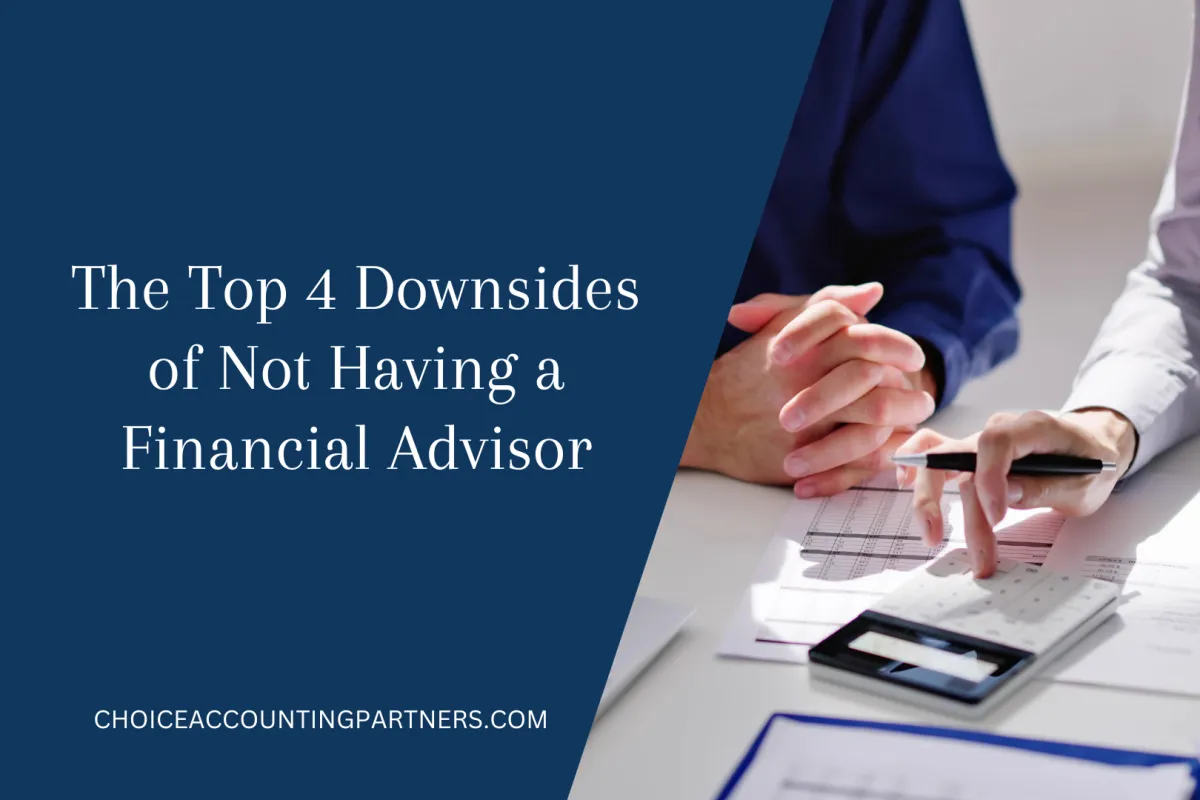

ON THE BLOG

The Top 4 Downsides of Not Having a Financial Advisor
The Top 4 Downsides of Not Having a Financial Advisor
Introduction:
It's wonderful to see that more and more people are becoming truly concerned about their financial future and are now looking for ways to achieve financial independence today. While that's fantastic news, you can reach your goal faster with the guidance of a qualified and competent financial advisor.

With the growing popularity of social media, many individuals believe that having 'free' access available to them is the best option to choose. I get it. Free sounds perfect when you are already struggling with your financial problems. However, things may become more complicated if you don’t quite understand the big picture, especially as one approaches critical life decisions regarding their finances.
Why do people believe that wealth creation and managing money is a deeply personal decision that cannot be outsourced professionally, whereas education and health require external intervention? There are several downsides to not seeking the services of a knowledgeable and ethical financial advisor in one's financial journey:
Here are some of the downsides of NOT employing a professional financial advisor.
Major 'financial mistakes'
Financial mistakes can be detrimental to your overall quality of life. Unfortunately, without the proper direction from a financial advisor, experience, and expertise, one can easily make these mistakes that could turn your life upside down. Common financial mistakes include not diversifying portfolios, investing without specific goals, ignoring taxation, ignoring inflation, and many more. Individuals often prioritize short-term benefits over long-term strategies. They fail to recognize that every financial strategy is unique to each person.
Falling for the wrong product
These days, the financial world has been overrun with a variety of complex financial products that can easily become overwhelming. Without enough knowledge and the lack of financial advice from a trusted advisor, investors on their own are vulnerable to improper and unregulated products. Listening to '(mis)influencers' on social media platforms and following random stock market suggestions can result in substantial losses in an individual's financial portfolio. It's painful for an investor to watch their hard-earned money disappear.
However, with the help of a qualified financial advisor, you can avoid purchasing the wrong product and safeguard your financial future. This person will provide you with the appropriate advice on investment items that are right for your specific financial situation.
Growing Financial Stress:
When it comes to repaying debts, investing, setting goals, and dealing with difficult economic conditions, financial planning can be stressful. In these situations, a sound financial strategy guided by a financial advisor is essential. Financial planning is an ongoing activity, not a one-time event, and should be reviewed regularly and updated as needed. A person may begin this process but become overwhelmed or lost in the middle of it, damaging their peace of mind.
A qualified financial planner considers both financial and non-financial areas of your life and aspirations and creates a road map to help the individual navigate current financial challenges while also planning for the future. This ensures financial peace of mind.
Individual investors frequently experience emotional reactions to various events involving money matters. An investor may be tempted to buy the wrong insurance policy just because a relative has recently taken an agency and wants to make a first sale or sell the stock at the slightest 'drop' in the market. While such decisions may appear emotional or reasonable at the moment, a financial advisor may have a different perspective. Personal financial advisors make decisions based on meticulous research and attention to detail.
A competent financial advisor regulates the investor's 'emotions' since he or she is aware of the individual's temperament as well as goals in life.
Investing without a clear financial goal:
Individuals may make decisions that are not in alignment with their objectives in the absence of goal-based investment planning. Individual investors may solely evaluate and consider the returns on a certain product and invest in items that do not align with their financial objectives. Identifying your risk level, the amount of time you have to invest, and your goals in life are the beginning stages in investment planning. After examining their client's overall profile, a financial advisor creates a thorough goal-based investment plan that serves as a road map to assist them in achieving their objectives.
To summarize, a financial advisor is like a RADAR that points an investor in the proper direction so that he can always stay on track to live a financially satisfied life!
See you in the next blog! :)





